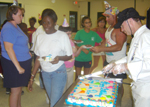Camp for burn injuries celebrates 10
years
by Tim
GehretPublic Relations
Life’s occasional unfairness is a lesson most learn at an early age and one of which we are continuously reminded as adults. Whether it’s being stuck in traffic, overwhelmed with work, or up to our eyes in debt, most don’t have to look too hard to find something to complain about.
 Camp St.
Christopher chef Steve Boyle, right, and camp director Ken Gypin serve
cake to campers and counselors at a party to celebrate Camp Can Do’s
10th anniversary.
Camp St.
Christopher chef Steve Boyle, right, and camp director Ken Gypin serve
cake to campers and counselors at a party to celebrate Camp Can Do’s
10th anniversary.These are relatively minor glitches compared to challenges faced by some of the world’s most vulnerable—such as problems Hannah Patenaude has dealt with for more than two-thirds of her life. When Hannah was 8 months old, her mother, Bobbie Patenaude, was preparing her bottle. She placed the bottle of water in the microwave. While holding Hannah on her hip, Bobbie shook the bottle and it exploded splashing scalding water on the child, causing severe burns on Hannah’s legs and feet.
Now, 9 years old with noticeable scars from multiple skin grafts, Hannah deals with looks of disgust from classmates and remarks like: “Gross! What happened to your foot?” Comments like these face her nearly every time she takes off her shoes—except, that is, for one week out of the year when she comes to camp.
Hannah is one of 30 children attending this year’s Camp Can Do, a summer camp which has been catering to seriously burned children for 10 years.
“When these kids come in, for some of them, it’s the first time they’re around other kids like them,” said Ronnie Davis, a 33-year-old camp counselor and firefighter from Columbia. “They can take their gloves off and have fun.”
Jill Evans, coordinator of pediatric services at MUSC, said the idea for Camp Can Do resulted from a movement about 15 years ago to provide camping experiences for children with specific needs. The camp, a cooperative effort between MUSC Children’s Hospital and South Carolina Firefighters, is held each year Camp St. Christopher campground on Seabrook Island and is funded completely by the MUSC Burned Children’s Fund.
Children who attend the camp spend the week fishing, engaging in arts and crafts, canoeing, swimming, playing games, being entertained and simply, but more importantly, interacting with other children who share similar difficulties.
“It’s funny,” Evans said. “A little girl last year came and said to me, ‘Did you know other kids here have been burned too?’ So these kids eventually start putting it together.”
This is Hannah’s second year at camp.
“The biggest experience she has is being with other kids who see what she’s been through,” Bobbie said. “They not only offer her support, but they don’t question it. They don’t see her for her scars. They each have something in common that they’re not going to get on the playground at school.”
But the camp offers something for the counselors as well, many of whom are firefighters.
“Look around you,” said Davis, one of several counselors who have attended camp all 10 years. “It’s bigger than you or I could put on paper. It keeps my life in perspective.”
“Sometimes we wonder who gets more out of it, counselors or campers,” Evans said.
Wayne Melton, a firefighter from the Bronx, N.Y., started as a counselor the camp’s first year when he was with the Columbia Fire Department. He continues to make the trip each summer.
“The guys back at the fire station say, ‘Man, Melton, are you ever going to work a fourth of July?’ I say, “Not as long as this is going on.’”
Camp Can Do usually runs the first week in July. Campers range between the ages of 6 and 17. Those who are invited either live in South Carolina or were treated at MUSC and moved away.
For second-year camp director and firefighter Ken Gypin, the hardest part is seeing the children go. “I was prepared to deal with what I saw when I got here, because I see them when the fire happens. What I wasn’t prepared for was the last day of camp,” he said.
“If there had to be a positive that came out of such a horrific situation,” Patenaude said, “it’s that she’s (Hannah) made lifelong friends.”
Friday, July 14, 2006
Catalyst Online is published weekly,
updated
as needed and improved from time to time by the MUSC Office of Public
Relations
for the faculty, employees and students of the Medical University of
South
Carolina. Catalyst Online editor, Kim Draughn, can be reached at
792-4107
or by email, catalyst@musc.edu. Editorial copy can be submitted to
Catalyst
Online and to The Catalyst in print by fax, 792-6723, or by email to
catalyst@musc.edu. To place an ad in The Catalyst hardcopy, call Island
Publications at 849-1778, ext. 201.